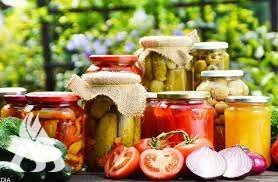
Scientific research warns against eating pickles, as they may cause serious illness

- 25-01-2022, 09:18
INA- sources
Food preservation can be defined as the process of processing and handling food in a way that stops or significantly slows down spoilage and avoids foodborne illness while preserving its nutritional value, texture and flavor.
To maximize the shelf life of food, it is often salted and pickled, a process believed to lead to the development of stomach cancer, according to the British newspaper, “Daily Express”.
According to the World Cancer Charity, it has been shown that high levels of salt alter the viscosity of the mucus that protects the stomach and promotes the formation of “N-Nitroso” compounds.
The Cancer Charity warns: “In addition, high salt intake may stimulate colonization of H. pylori, the strongest known risk factor for stomach cancer.
High levels of salt have also been shown to be responsible for the underlying cellular damage that promotes the development of stomach cancer.
Examples of non-starchy vegetables include: carrots, beets, parsnips, and turnips, as well as green leafy vegetables (such as spinach and lettuce), cabbage, broccoli, arugula, and allium vegetables (such as onions, garlic, and leeks).
Starchy vegetables such as potatoes and sweet potatoes contain higher levels of carbohydrates than non-starchy vegetables.
Earlier, a landmark study published in the British Journal of Cancer revealed that people who eat a regular diet of high-salt foods double the risk of stomach cancer, according to a report published in the British Journal of Cancer.
The study, which was based on nearly 40,000 middle-aged Japanese, examined eating, drinking and smoking habits over an 11-year period.
The study showed that the risk of stomach cancer in Japanese men who had the least amount of salt was one in 1,000 people annually, and this doubled to one in 500 among those with the highest salt intake.
The study showed that there are many possible symptoms of stomach cancer, but it can be difficult to detect.
According to the British Public Health Agency (NHSStomach cancer can affect digestion, such as heartburn or GERD, dysphagia, frequent belching, and feeling full too quickly when eating.
Other symptoms include loss of appetite or weight loss without trying, swelling in the upper abdomen with pain and feeling tired or lacking in energy.
Al-Amiri warns of any war between Iran and the US
- politics
- 25/04/01












